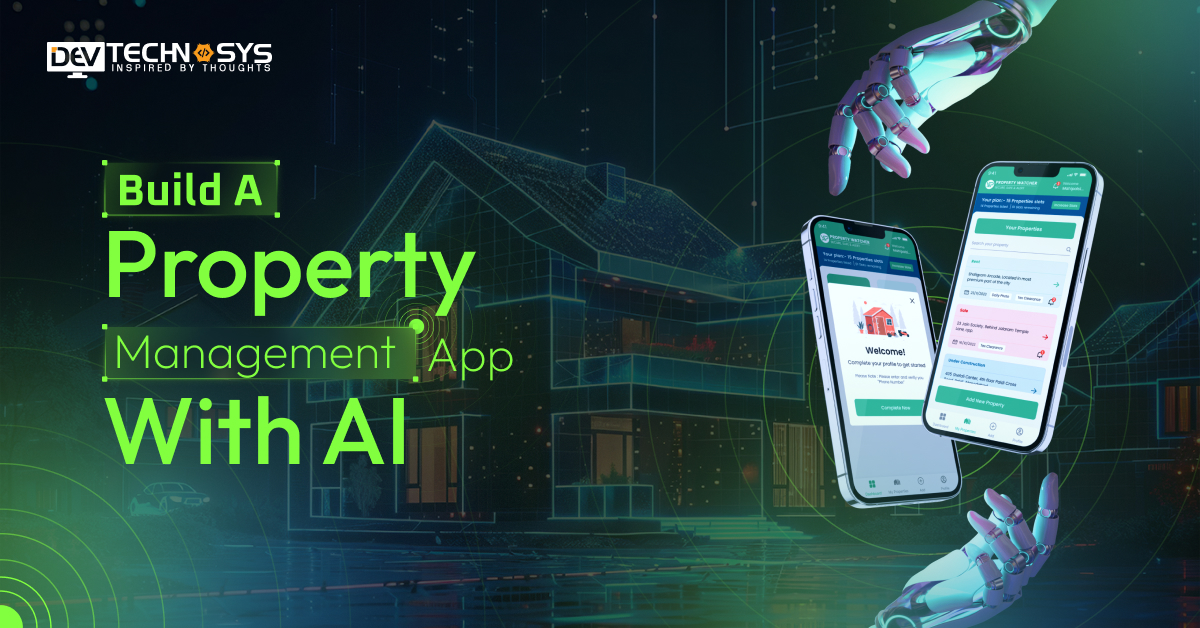“Make your business foundation strong by creating a real estate application with AI.”
The time to transform old and existing real estate systems has come with the introduction of super tech like AI and Blockchain. Modern entrepreneurs are investing money to build a property management app with AI due to its capability of enhancing business processes. The UAE real estate market is growing rapidly as users interest is increasing in property ownership.
The idea to make a property management app with AI has a lot of benefits that help business investors to generate huge profit and increase user engagement. More than 65% of the population in UAE are into the real estate industry as buyers or sellers.
So, we are putting some light on this industry and understanding the development process of property management apps by using AI.
Why Property Management Demands Smart Tech in 2025
Real Estate services are transforming due to a rapid evolution in property management in 2025. In the industry, smart technologies are now crucial for maintaining efficiency, competitiveness, and compliance:
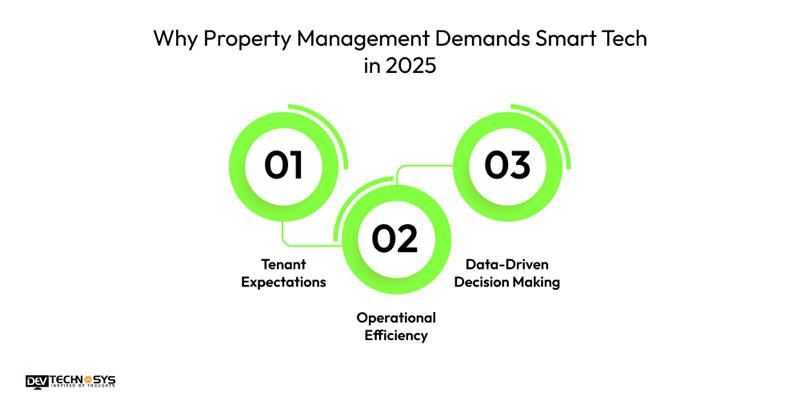
1. Tenant Expectations
Tenants of today expect smooth digital communication, maintenance requests, and rent payments. Tenant retention and satisfaction are increased when these expectations are met.
2. Operational Efficiency
Routine processes like scheduling, billing, and issue tracking are automated by smart technology. For property managers, this lowers manual labor and increases overall productivity.
3. Data-Driven Decision Making
Businesses should target real estate app development solutions in Dubai to make well-informed decisions. They must be based on maintenance history, rental performance, and occupancy patterns.
- The UAE real estate market was valued at approximately $637.4 Billion in 2024 and is projected to reach $1.26 Trillion by 2032.
- It is growing at a rate of 8% CAGR from 2026 to 2032.
- The residential market in the UAE was valued at $36.32 Billion in 2024 and is expected to grow to $52.32 Billion by 2030, with a rate of 1% CAGR.
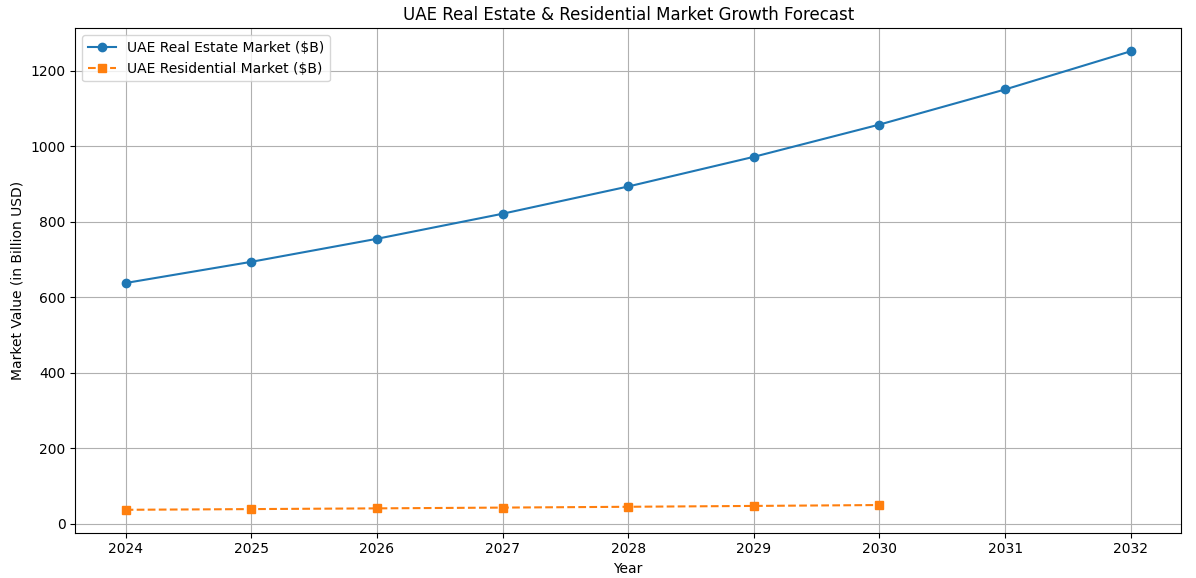
- Dubai achieved record-breaking real estate transaction values totaling over $207.22 Billion from 226,000
- Dubai’s residential property price index rose by 46% in November 2024, indicating strong demand and price appreciation.
- The UAE is projected to be the leading destination for millionaire migration in 2024, with an estimated 6,700 millionaires moving there.
Benefits of Developing Property Management Apps
Property owners can develop a property management app with AI to revolutionize the real estate industry. These digital technologies increase overall efficiency, decrease manual labor, and streamline procedures:
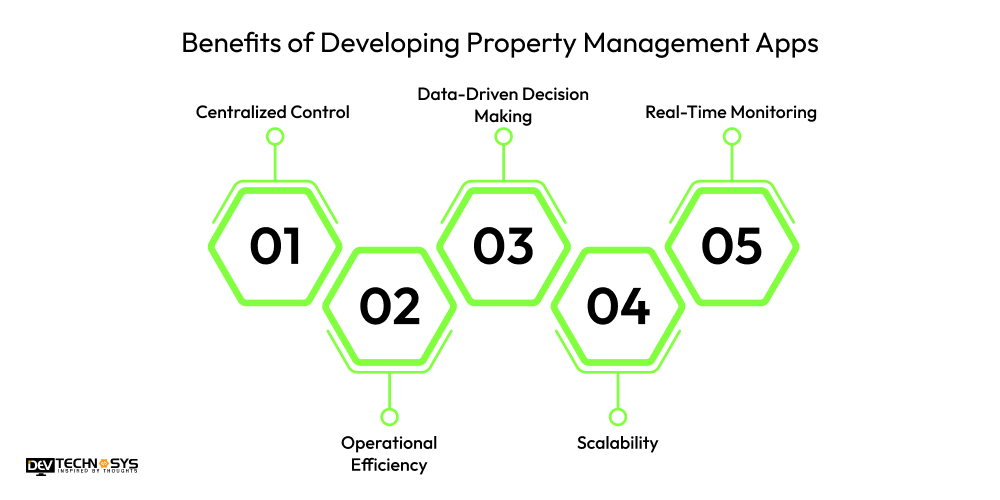
1. Centralized Control
A single dashboard for managing leases, rent collection, upkeep, and communication is offered by a property management app. Entrepreneurs may avail real estate app development services to lessen reliance on manual tracking or several tools.
2. Time & Cost Savings
Administrative hours are reduced when repetitive operations like issue reporting, invoicing, and rent reminders are automated. You can build a property management app with AI for large real estate businesses and agencies.
3. Improved User Experience
Self-service features like online payments, support tickets, and real-time alerts are advantageous to tenants. Property managers can hire a mobile app development company in UAE to benefit from increased visibility and quicker reaction times.
4. Scalability
Apps can easily scale operations, whether they are handling five or five hundred properties. They manage expanding portfolios without increasing personnel or resources in line with the growth. This makes it possible for real estate companies to grow more quickly and effectively.
5. Real-Time Monitoring
Managers may monitor property conditions, rent status, and maintenance requirements in real time with the help of integrated analytics and IoT technologies. It makes it possible to address problems proactively. The lifetime of assets and the quality of services are enhanced by this degree of visibility.
Role of AI to Enhance Property Management Features
Businesses can make a property management app with AI by improving decision-making, automating repetitive operations, and customizing tenant experiences. Artificial Intelligence development in Dubai makes property management more intelligent by increasing operating efficiency, cutting expenses, and enabling proactive maintenance.
- Automates rent pricing based on market trends and demand.
- Predicts maintenance needs to prevent costly breakdowns.
- Provides 24/7 tenant support through intelligent chatbots.
- Analyzes tenant behavior to improve retention strategies.
- Enhances security with AI-powered surveillance and access control.
How to Build a Property Management App With AI?
Here, we will understand the process to build a property management app with AI. So, businesses can easily make budget specifications and manage resources timely:
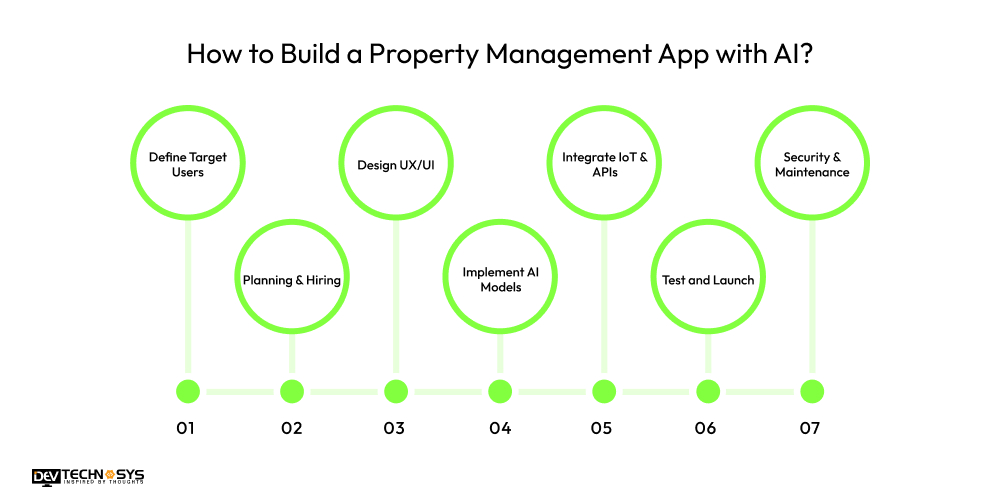
1. Define Target Users
To develop a property management app with AI, you must determine app users like landlords, property managers, or renters. Recognize their requirements, difficulties, and the particular issues that your app will address for each group. This influences the features and user experience of the app.
- Who are the primary users of the app?
- What are the key pain points?
2. Planning & Hiring
Make a thorough project plan that includes the technology stack, budget, schedule, and scope. Employ qualified experts like IoT specialists, React developers, UI/UX designers, and AI specialists. So, you must contact a real estate app development company to make a property management app with AI.
- What is the estimated budget for the project?
- Should we build the app with an in-house team?
3. Design UX/UI
Create intuitive, user-friendly interfaces that are suited to various user roles. Concentrate on making complicated activities easier via AI-powered automation and intuitive navigation. Prior to creation, include feedback loops to enhance usability.
- How can we design intuitive AI features?
- What elements will improve user engagement?
4. Implement AI Models
Include AI features like chatbots, maintenance predictions, rent pricing algorithms, and predictive analytics. Additionally, you must approach a real estate app development company to select suitable machine learning models and use high-quality datasets related to property management.
- What types of AI models must be added?
- Do we need to build custom AI models?
5. Integrate IoT & APIs
For real-time property monitoring, connect IoT devices like sensors, thermostats, and smart locks. To improve app functionality, use APIs to connect with third-party services like payment gateways, document verification, and real estate listing platforms.
- Which IoT devices need to be used?
- What third-party APIs are necessary?
6. Test and Launch
To guarantee dependability and performance, carry out testing, including functional, security, and user acceptability tests. Additionally, you must hire app developers to get feedback and make changes, test the app with a limited number of users.
- What types of testing are essential?
- How can we collect early user feedback?
7. Security & Maintenance
Put strong data security safeguards in place, like access limitations and encryption. Update AI models often, address errors, and enhance functionality in response to user input. This influences the overall cost to build a real estate app.
- What security protocols are used to protect user data?
- How frequently should we update the app?
Essential Features of an AI-Powered Property Management App
AI-powered property management apps provide intelligence, automation, and customisation. These features improve tenant happiness while assisting property managers in making more informed decisions:
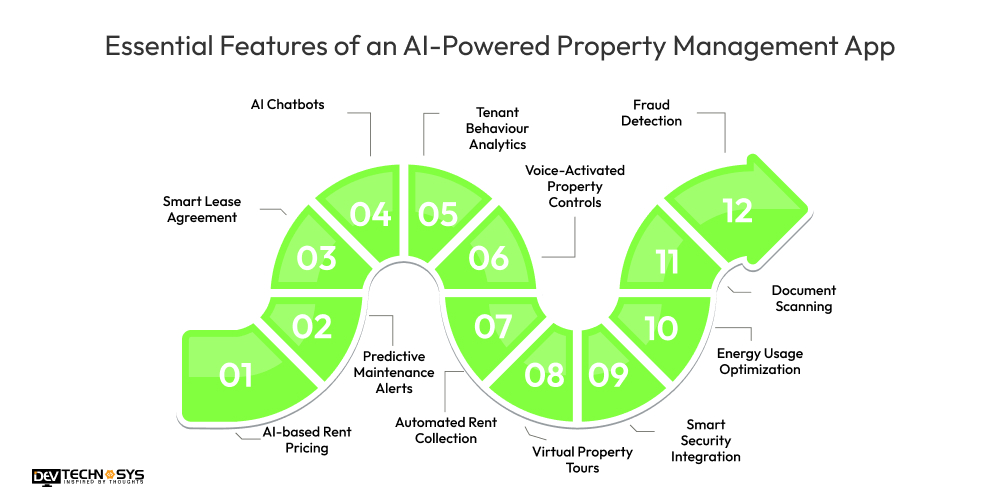
1. AI-based Rent Pricing
Various real estate apps use market trends, location data, and demand analytics to recommend optimal rental prices. This maximizes occupancy and revenue while staying competitive.
2. Predictive Maintenance Alerts
AI analyzes historical maintenance data and sensor inputs to predict equipment failures. This enables timely repairs and reduces unexpected breakdowns.
3. Smart Lease Agreement
AI auto-generates lease documents with dynamic clauses based on property type, location, and tenant profile. It ensures legal accuracy and faster onboarding.
4. AI Chatbots
Intelligent chatbots handle tenant queries, maintenance requests, and payment issues 24/7. Various real estate apps in UAE reduce response time and improve support efficiency.
5. Tenant Behavior Analytics
The app monitors tenant activities and preferences to generate behavior insights. This helps in offering personalized services and identifying at-risk tenants.
6. Voice-Activated Property Controls
It integrates with voice assistants for managing lights, locks, and appliances. You can make a real estate app so tenants can control smart devices using simple voice commands.
7. Automated Rent Collection
AI schedules rent reminders, processes payments, and flags delays. This improves cash flow and minimizes manual intervention.
8. Virtual Property Tours
Real estate mobile apps use AI to enable interactive 3D tours and property walkthroughs. Prospective tenants can explore properties remotely, reducing site visits.
9. Smart Security Integration
Connects with AI-enabled cameras, smart locks, and intrusion detection systems. Property managers can monitor security events in real time.
10. Energy Usage Optimization
AI analyzes energy consumption patterns to adjust HVAC, lighting, and appliances. This cuts utility costs and promotes sustainability.
11. Document Scanning
Top real estate apps use OCR and AI to extract, store, and organize lease agreements, IDs, and financial documents. It simplifies recordkeeping and reduces paper use.
12. Fraud Detection
AI scans for unusual payment patterns, identity mismatches, or suspicious lease data. This helps prevent fraud and ensures compliance.
Real-World AI Use Cases in Real Estate
By improving accuracy, efficiency, and user experience, AI is rapidly changing the real estate sector. These real-world examples show the impact of AI in smart infrastructure and real estate appraisal:
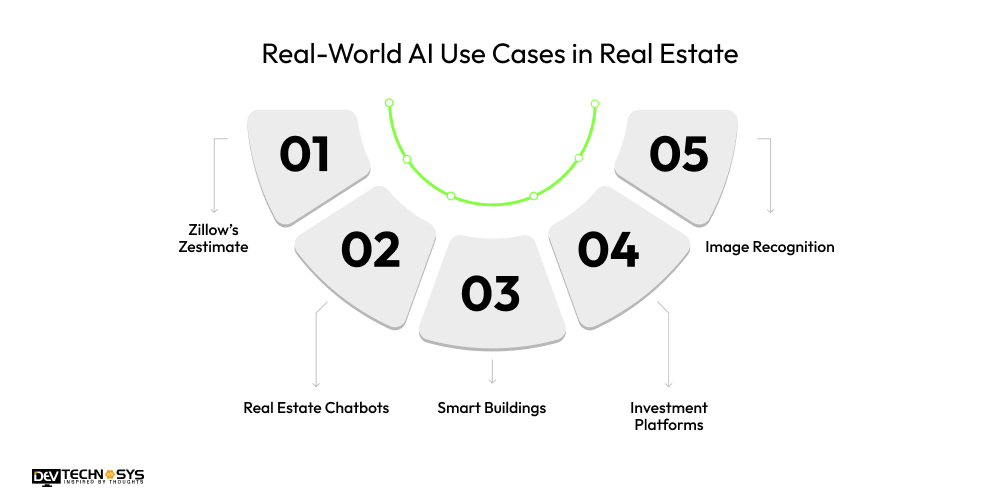
1. Zillow’s Zestimate
Machine learning algorithms are used by Zillow’s Zestimate to evaluate enormous volumes of data, including location and sales history. You can develop a real estate app to give buyers and homeowners an automated evaluation of the value of their properties.
2. Real Estate Chatbots
Chatbots driven by AI help users by promptly managing support requests, setting up viewings, and responding to questions. By working around the clock, they lessen agents’ workloads and increase engagement with tailored interactions.
3. Smart Buildings
In smart buildings, AI works with IoT devices to automate security, climate control, and lighting. Without human input, these devices maximize comfort and energy efficiency. So, businesses must target iOS app development in UAE.
4. Investment Platforms
In order to suggest investment opportunities, AI-driven platforms examine financial indicators, market data, and real estate patterns. They facilitate data-driven decision-making by assisting investors in estimating risk and ROI.
5. Image Recognition
Property photographs are categorized and tagged using AI-powered image recognition, improving search ability on listing sites. Additionally, it can detect characteristics like damages or room types, which expedites the production and verification of listings.
AI Chatbots vs. Traditional Customer Support in Real Estate
AI chatbots are revolutionizing real estate customer service by offering round-the-clock, immediate, automated help. An AI chatbot development company helps to provide accurate answers to several requests at once. This comparison shows the main distinctions between them.
Aspect |
AI Chatbots |
Traditional Customer Support |
| Availability | 24/7 instant responses | Limited to business hours |
| Scalability | Handles thousands of queries simultaneously | Limited by number of available agents |
| Cost Efficiency | Lower operational costs after setup | Higher ongoing labor and training costs |
| Consistency | Provides uniform answers and behavior | Answers may vary depending on agent |
| Personalization | Uses AI to tailor responses based on user data | Relies on agent experience and memory |
Combining IoT & AI for Property Management
Property management is being revolutionized by the combination of IoT and AI. This special combination increases productivity, lowers expenses, and raises tenant satisfaction:
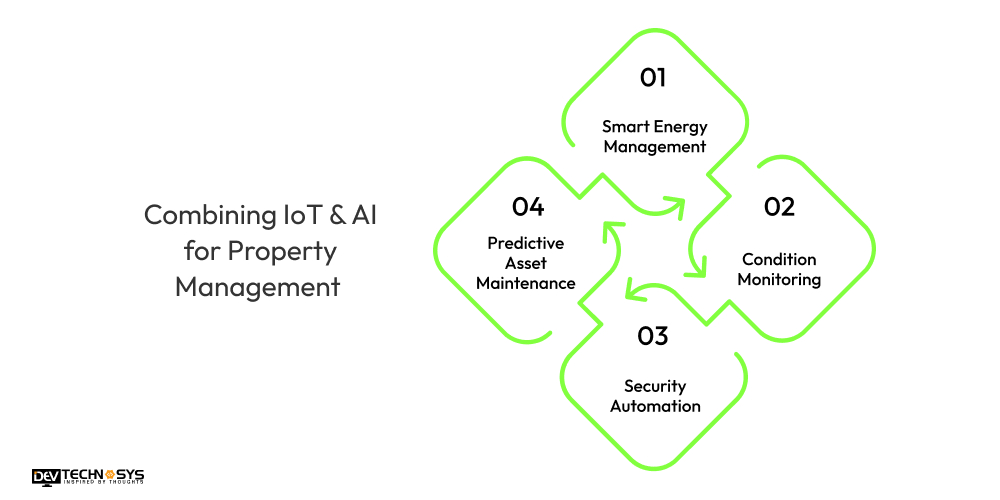
1. Smart Energy Management
Real-time energy consumption is monitored by IoT sensors, and AI optimizes lighting and HVAC systems. You can create a property management app with AI to modify usage accordingly.
Impact: Supports sustainability objectives and lowers energy expenses.
2. Condition Monitoring
IoT devices measure temperature, humidity, and equipment condition; artificial intelligence analyzes this data to spot irregularities. It makes real-time notifications and property condition insights possible.
Impact: Assures healthier living conditions and guards against damage.
3. Security Automation
AI is used to improve motion detectors and IoT-enabled cameras for danger detection. For suspicious activity or unwanted access businesses may target this Android app development solution in Dubai.
Impact: Reduces security breaches and improves safety.
4. Predictive Asset Maintenance
IoT sensors track performance of equipment, and AI uses usage patterns to detect problems before they arise. This makes it possible to service elevators, HVAC systems, and other vital systems on schedule.
Impact: Lowers emergency repair expenses and prolongs asset life.
AI-Powered Tech Stack for Developing Property Management Apps
To create a property management app with AI, the tech stack must provide security, and intelligent features. Performance is guaranteed when cloud services, and AI frameworks are combined with AI development services in UAE. The following is a list of essential elements frequently found in such development:
Component |
Use |
| Python | Primary programming language for AI model development and backend logic. |
| TensorFlow / PyTorch | Frameworks for building and training machine learning models. |
| React Native | Cross-platform mobile app development for iOS and Android. |
| Node.js | Backend server runtime environment for handling API requests and business logic. |
| AWS / Azure Cloud | Cloud infrastructure for hosting, data storage, and scalable computing power. |
| MongoDB / PostgreSQL | Databases to store tenant, property, and transactional data securely. |
| Dialog flow / Rasa | AI-powered chatbot frameworks for tenant support and query handling. |
| IoT Platforms (e.g., AWS IoT Core) | Manage and connect IoT devices like smart locks and sensors. |
| OpenCV | Image processing and document scanning for lease agreements and IDs. |
| OAuth 2.0 / JWT | Secure authentication and authorization for users and administrators. |
What is the Cost to Develop a Property Management App With AI?
The cost to build a property management app with AI is dependent upon a number of strategic and technical choices. Knowing these elements facilitates precise budgeting and resource optimization:
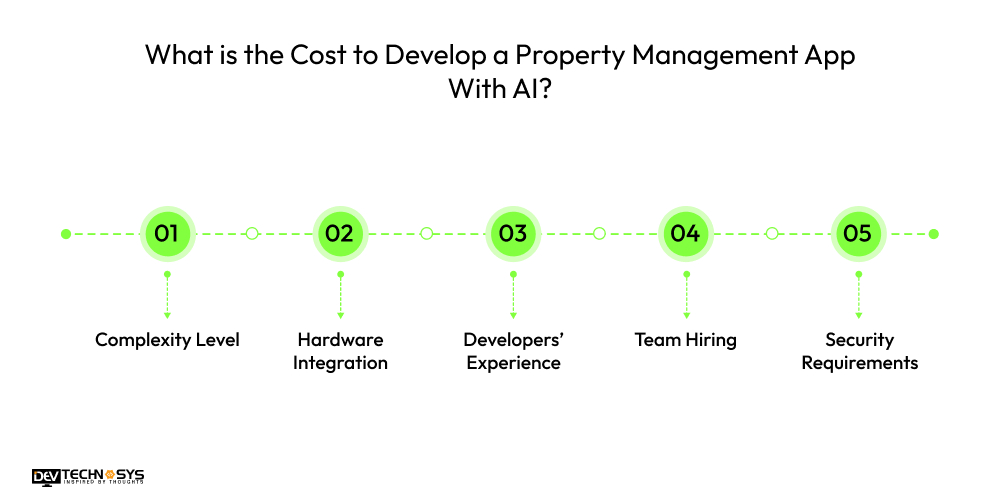
1. Complexity Level
Apps with voice control, predictive maintenance, or AI-driven analytics are more expensive than those with simple functionality like rent tracking. The cost to develop a real estate app increases with the advancement of the AI algorithms and user interfaces.
Complexity Level |
Development Time |
Estimated Cost |
| Simple | 2-5 months | $5000-$10000 |
| Moderate | 5-8 months | $10000-$15000 |
| Complex | 8-12 months | $15000-$20000 |
| Premium | More than 12 months | $20000-$25000 |
2. Hardware Integration
The cost to develop a property management app with AI is greatly increased when IoT devices like sensors are integrated. Additional testing, compatibility modifications, and real-time data synchronization are necessary. Long-term expenses are also increased by maintaining these linkages.
Component |
Estimated Cost (USD) |
| Smart Lock Integration | $3,000 – $6,000 |
| IoT Sensor Connectivity | $5,000 – $10,000 |
| Energy Monitoring Systems | $4,000 – $8,000 |
3. Developers’ Experience
The real estate app development cost is increased by hiring skilled AI and real estate app developers as they guarantee higher quality. Complex features can be handled more effectively by senior developers, which lowers risks.
Developers’ Experience |
Cost Estimation |
| Junior/Entry-Level | $8000-$12000 |
| Mid-Level/Experienced | $12000-$16000 |
| Senior/Expert | $16000-$20000 |
| Professional | $20000-$24000 |
4. Team Hiring
The cost to develop a mobile app is affected by the decision of whether to use in-house, freelancing, or outsourced development teams. Although they are more expensive, in-house teams provide control and outsourcing can save money but may compromise teamwork.
Team Hiring |
Estimated Cost |
| In House Team | $5,000-$8,000 |
| Full-Time Freelancers | $3,500-$5,000 |
| Developer Outreach | $8,000-$15,000 |
5. Security Requirements
Strong security layers are necessary when handling sensitive data, such as lease paperwork, payment information, and tenant information. Development and testing expenses are increased by features like data encryption, biometric login, and GDPR compliance.
Component |
Estimated Cost (USD) |
| Data Encryption (End-to-End) | $2,000 – $5,000 |
| Multi-Factor Authentication (MFA) | $1,500 – $3,500 |
| Regulatory Compliance (e.g., GDPR) | $3,000 – $6,000 |
Challenges of Using AI in Property Management App Development
Property management benefits from AI’s creativity and efficiency, but there are also ethical and technical issues. Businesses can build a real estate app for scalable real estate services requires addressing these problems:
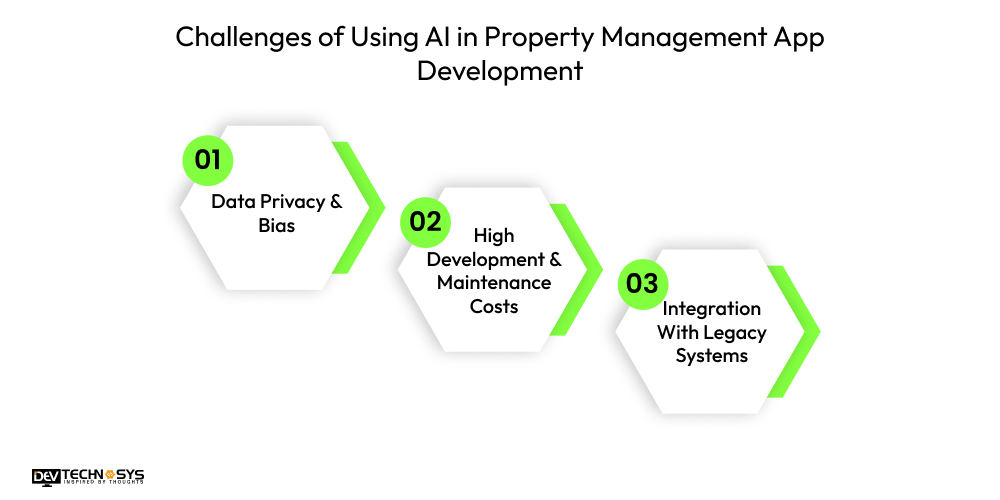
1. Data Privacy & Bias
Sensitive tenant and property data is frequently processed by AI systems, which raises questions on potential breaches. Inaccurate decision-making or unfair treatment can also result from biased algorithms.
Solution: To guarantee moral AI practices, use data encryption and frequent audits.
2. High Development & Maintenance Costs
Large datasets and qualified personnel are needed to build AI-powered features that increase the cost to maintain an app. Long-term costs are increased by ongoing updates and model training.
Solution: To minimize upfront costs, start with scalable MVPs and leverage pre-trained AI models.
3. Integration With Legacy Systems
The structure or APIs required to interface with contemporary AI tools may be absent from older property management systems. Delays, incompatibilities, and increased complexity result from this.
Solution: To connect new AI solutions with legacy platforms, use middleware or bespoke APIs.
How to Monetize Real Estate Apps in 2025?
You can create a real estate app using a variety of revenue sources to increase business profitability. Subscriptions, data, and value-added services are the main focuses of 2025 monetization plans:
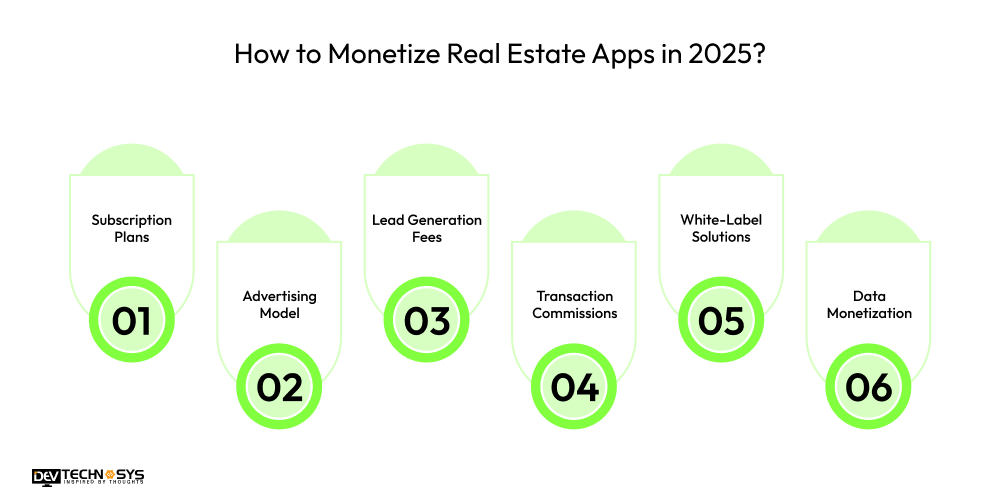
1. Subscription Plans
Businesses may develop a property management app with AI to provide tiers of plans that grant access to premium features such as enhanced management tools, priority listings, and AI analytics. Users can upgrade their skills for a monthly or annual fee.
2. Advertising Model
Realtors, home service companies, and mortgage lenders can purchase advertising space from real estate apps. Click-through rates are raised by user behavior-based targeted advertisements. Apps with a lot of users benefit from this ad-based model.
3. Lead Generation Fees
For confirmed buyer and renter leads, charge developers, landlords, or real estate brokers. AI is able to qualify leads according to user behavior and intent. Businesses clearly benefit from this performance-based revenue model of real estate applications.
4. Transaction Commissions
Receive a commission for every successful rental, purchase, or service reservation made via the app. Contract automation and secure payment gateways facilitate this procedure. Revenue and user success helps to reduce the cost to develop a house finder app for businesses.
5. White-Label Solutions
Give agencies or property managers a license to use your real estate platform under their own name. They can now deploy customized apps without having to start from scratch thanks to this. For tech suppliers, it’s a lucrative business-to-business approach.
6. Data Monetization
For sale to investors or analytics companies, compile and anonymize user behavior, pricing patterns, and real estate insights. Assure data privacy and adherence to rules. This offers insights-driven services that generate passive income.
Major Future AI Trends in Real Estate Business
AI is providing smarter, more automated, and intuitive experiences. To improve operations and user engagement, emerging trends emphasize automation, personalization, and immersive technologies:
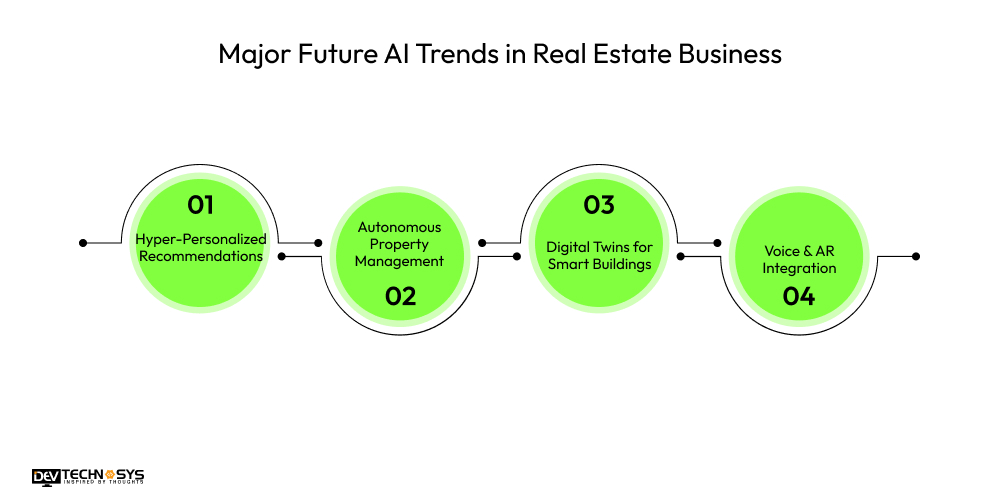
1. Hyper-Personalized Recommendations
AI will provide recommendations for properties based on each person’s tastes, habits, and way of living. Businesses should make a real estate app to increase conversion rates and enhance search accuracy.
2. Autonomous Property Management
AI systems will manage repetitive duties like scheduling maintenance and communicating with tenants. These real estate app development trends result in property portfolios that are completely automated and run by themselves.
3. Digital Twins for Smart Buildings
AI-powered digital models of buildings will replicate energy use, maintenance requirements, and performance in real time. This facilitates effective resource planning and predictive management.
4. Voice & AR Integration
While AR will allow for interactive property tours, voice assistants will allow users to search, book, or manage properties hands-free. When combined, they improve real estate decision-making and user experience.
In a Nutshell!!
Now, to create a property management app with AI, you must approach a leading mobile app development company like Dev Technosys. Business investors may experience a quite dedicated environment for real estate app development. We offer:
- Affordable real estate app development services in UAE.
- A fixed process to build a property management app with AI.
- Insights on various business models and AI-based tech stack.
These are some highlights benefits that we provide to our clients helping them to make smart and interactive real estate applications.
FAQs
1. Which are the Leading Property Management Apps in the UAE?
Dubizzle, Property Finder, BayutPro, and ManageMyProperty are a few of the best property management applications available in the UAE. These platforms provide UAE-specific rental administration, listing, and tenant communication options.
2. How Long Does it Take to Build a Property Management App With AI?
The time depends on the complexity, number of features, and integrations with third-party or IoT systems. Creating a property management software with AI capabilities usually takes 4 to 8 months.
3. What is the Maintenance Cost of Home Finder Applications?
The maintenance cost depends on the size of the user base, cloud hosting, AI model updates, and security needs. The house locator app maintenance costs may range from $1,000 to $5,000 annually.
4. How Much Does it Cost to Hire Real Estate App Developers?
The cost of hiring mobile app developers depends on location, experience, and app complexity. It ranges anywhere from $10 to $60 per hour, with project prices ranging from $8,000 to $25,000.
5. Why is AI Important for the Real Estate Industry?
- AI analyzes market trends for buyers.
- It streamlines processes like property listing.
- AI delivers personalized property recommendations.



